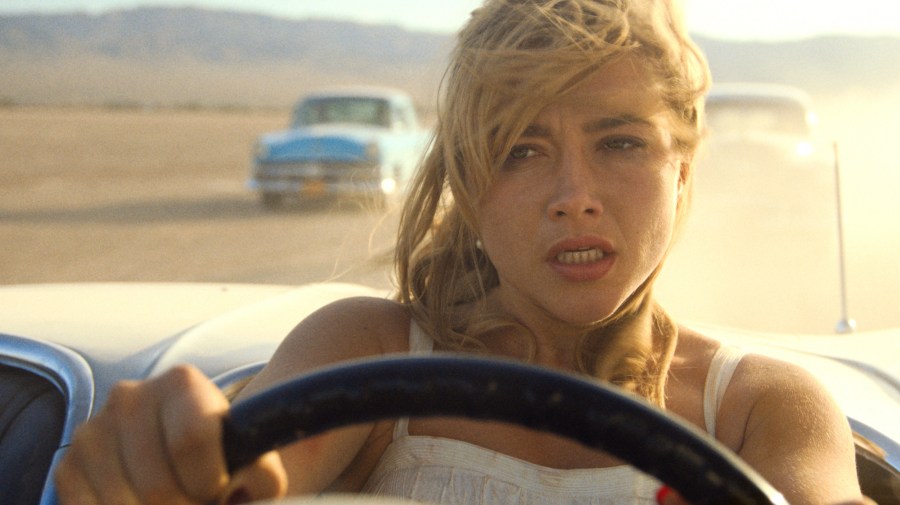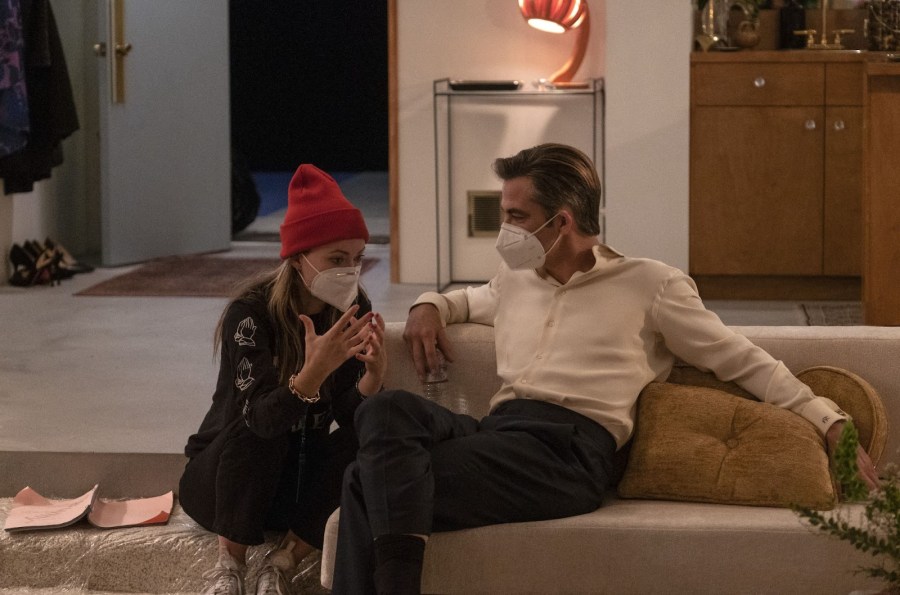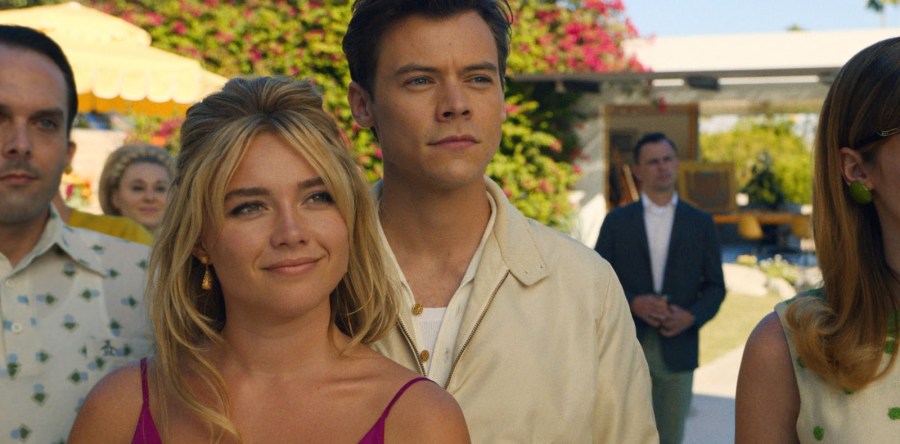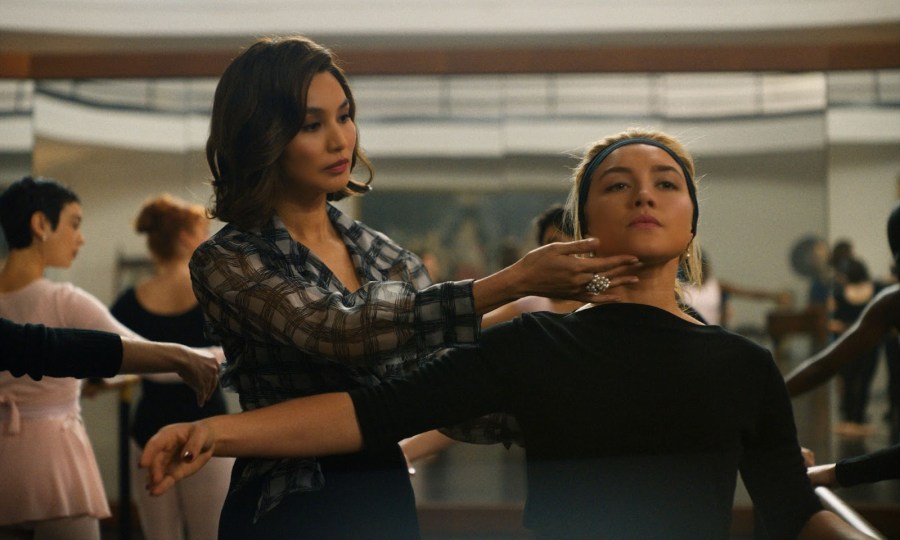
Rating: 8/10
Don’t believe everything you’ve read or heard online about Don’t Worry Darling. It is a very good movie. Olivia Wilde’s second directorial achievement after her Booksmart (2019) debut has been mired in constant gossip and speculation. I’ll admit: I too obsessed over the premiere of the movie at the Venice International Film Festival and read more than one take on the infamous Spit-Gate. I also couldn’t get enough of the Chris Pine memes. Who would?
But I know the movie — or the personal lives of those involved in it — wouldn’t have been judged so meticulously had Wilde been a man. So I went to watch Don’t Worry Darling, which debuts in theaters this Friday, September 23, and put aside everything else to assess it for its cinematic merits. I liked what I saw.

In Don’t Worry Darling Florence Pugh (Little Women) plays Alice. She’s a housewife living in Victory, a utopian community that seems like something out of 1950s Palm Springs. She’s married to Jack (Harry Styles). During the day, he and the rest of the men in Victory leave their wives at home and head to their very important and secret jobs in the “development of progressive materials,” whatever that means. The women stay at home, cleaning the bathrooms, vacuuming, and making sure there’s something home-cooked on the table for dinner. They also attend the demanding ballet classes conducted by the perfectionist Shelley (Gemma Chan).
When Jack gets home at night, Alice is waiting for him, perfectly dressed and coiffed. There’s a roast on the table and music playing on the record player. He’ll go down on her before they have dinner; Wilde has made a point of only showing women orgasming in the movie. She doesn’t turn away from Pugh’s face when her character is having sex. Sometimes there’s a neighborhood party to go to after that, with music, dancing and continuous drinking. Wilde herself plays Bunny, one of the veteran and more content housewives in Victory.
And the cycle of cooking breakfast, housecleaning, having sex and partying goes on and on. That is, until the veneer of perfection starts chipping away. Margaret (Kiki Layne), another Victory resident, is said to be unwell. She manages to warn Alice that something isn’t right in Victory. It won’t take long until she too realizes nothing can be this idyllic. The movie, which Wilde has described as a psychological thriller, encourages Alice — and the viewer — to dare to break the rules and ask questions.
There’s a big reveal in the film’s third act that perfectly wraps up all the unexplained bits of storytelling that were left hanging up to that point. But even if I didn’t see the twist coming, I knew something wasn’t right in Victory from the beginning. It captures a version of a ‘50s community on a cul-de-sac that feels a bit different from portrayals of conservative, white small towns that often appear on screen. People are predominantly white, though not exclusively. Interracial marriages aren’t frowned upon. Alice is very open about the fact that she doesn’t want to have children. There’s not a single dog in sight.

There’s a circular theme present in Don’t Worry Darling and, by the end of the movie, you’ll see that it fits perfectly with the theme of the film. Wilde and cinematographer Matthew Libatique (A Star Is Born) are deliberate in their enveloping tracking shots around the characters and their top-down shots of round forms.
Pugh is the central figure in the film and on the screen. All the other characters are merely supporting ones. And she carries Don’t Worry Darling in a way only an actor of her caliber can. At times you’ll be reminded of her work in Midsommar (2019) as the two films share some elements: Their cult undertones and the fact that they’re horror stories taking place in plain daylight.
Styles does his best to play against Pugh but, in a way, it makes perfect sense that his character lacks the charisma to stand on equal terms with her on the screen. You’ll start feeling uncomfortable with Jack when he advises Alice not to get hysterical, imploring her to get ahold of herself. And it’ll only get worse.
Don’t Worry Darling is a cautionary tale about toxic masculinity and unhealthy relationships. It dares the viewer to open their eyes and analyze everything they’ve taken for granted. In these times of curated picture-perfection on social media, Wilde and Don’t Worry Darling writer Katie Silberman (Booksmart) warn us that nothing is as flawless as it looks. Beware of paradise, Don’t Worry Darling advises, especially if the way out of it isn’t clear. Real life is messy and often ugly.

Even if I thoroughly enjoyed the movie — including its stylistic choices, the narrative, the costumes, the interior design and Pugh’s performance — I’m not completely happy with Wilde’s work when it comes to one particular character: Pine’s Frank. He’s the leader of Victory and the man who all the men in the community want to impress and emulate. Let’s just say there’s a creepiness to Frank I wasn’t ready to witness in Pine. He is, after all, my favorite Hollywood Chris.






